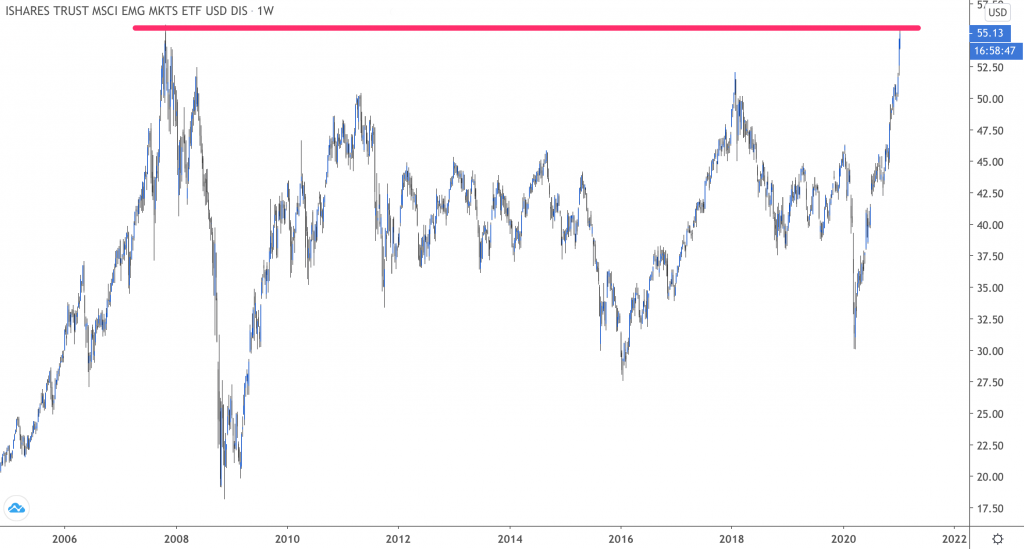With U.S. stocks at all time highs, it may be time to start looking elsewhere for opportunity. And this corner of the market is looking especially attractive now.
The market started the year off on a high note, with all three major indexes hitting fresh record highs in just five trading days. And while stocks have slid a bit since, the S&P 500, Dow, and Nasdaq are all still within striking distance of their newly-set highs.
Thornburg Investment Income Builder Fund co-portfolio manager Ben Kirby said this week that the “stars are aligning” for emerging markets.
“There’s a lot of opportunity, a lot of risks, but I think emerging markets are really attractive right now,” the $10.5 billion fund manager said. “Emerging market cycles tend to last several years. Emerging markets have underperformed for a quite a few years until last quarter, and emerging markets outperformed in a bull market. That’s interesting to us, so we think we’re probably at the early innings of what could be a sustained period of emerging market outperformance.”
The EEM Emerging Markets iShares MSCI ETF is currently trading at record highs not seen since 2007 as a flood of liquidity and optimism over a global economic rebound has fueled risk appetite.
The emerging market equity benchmark has hit new highs after stock valuations and market capitalization both reached fresh records in a rally that has added more than $10.8 trillion in a little over nine months, the fastest bout of wealth creation in the history of emerging markets.

Emerging market stocks have underperformed U.S. peers over the past decade and have often bore the brunt of risk-off shifts ranging from the taper tantrum to slowing growth in China amid the trade war sparked by President Donald Trump.
Kirby said that even as trade tension remain heightened with the U.S., China still looks attractive. In the latest move against the country, the Trump administration recently banned Americans from holding certain Chinese stocks, namely Chinese telecom stocks China Mobile Ltd., China Telecom Corp., and China Unicom Hong Kong Ltd.
“The geopolitical tensions will continue because there are fundamental differences and fundamental challenges that the two countries have,” Kirby said. “But that being said, we think the tone can be better under [President-elect Joe] Biden; the tone was pretty rough under [President Donald] Trump. The reality is China grew in 2020, the only major economy to grow, and we think they’re going to keep growing in 2021.”
As emerging markets continue to outperform this year, Kirby highlighted three stocks in particular that should benefit: Brazilian airline Azul (NYSE: AZUL), chipmaker Taiwan Semiconductor (NYSE: TSM), and SBI Card, an Indian fintech.
“If you think about the reopening trades, you think of airlines that have really been hit pretty hard,” Kirby said. “Azul is actually a quality company, they’re a company with dominant market share, and many of their routes they’re the sole provider.”
Kirby added that SBI Card should benefit from growing credit card adoption in India, and Taiwan Semiconductor is a solid growth play on the ongoing tech boom.
Taiwan Semiconductor is up nearly 16% so far this year, and announced this week that it plans to spend $28 billion to increase the capacity of its plants as demand grows worldwide for chips.
The chipmaker’s chairman, Mark Liu, said that the coronavirus pandemic has boosted demand, which the company expects to continue even as vaccines for the deadly virus are distributed around the world. Due to the surging demand, there are shortages of products ranging from video game systems, to automobiles, and graphics cards as there are not enough semiconductors to finish them.
And Taiwan Semiconductor’s increased production capacity suggests that the race to dominate semiconductor manufacturing to meet demand is intensifying.
“Usually, historically, when you see TSMC’s capital expenditure numbers, it’s a good leading indicator of how they are seeing demand,” said Brian Bandsma, a portfolio manager at Vontobel Asset Management. “They are very conservative about their capital expenditures number. They’re not going to be overly aggressive.”